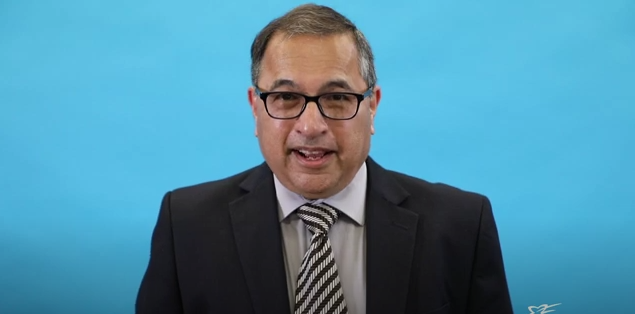A Newmarket man is among the latest confirmed cases of the faster spreading U.K. variant of COVID-19, which has more than doubled in York Region in the last two weeks, with more than half acquired in the community.
Fifteen cases of the variant have been confirmed to date, with at least nine acquired by local transmission, said York Region medical officer of health Dr. Karim Kurji.
“Nine are acquired locally that don’t seem to have any association with travel cases. This is not good news for us,” he said on his weekly video update today.
The Newmarket man, aged in his 30s, acquired the variant strain in the community, and not through contact with a confirmed travel case, according to regional spokesperson Patrick Casey.
All but one of the 15 cases have been investigated, Kurji said, and at least three more of the variant strain, identified as B.1.1.7., are anticipated, according to results from the Public Health Ontario labs.
As of Jan. 12, seven variant cases were confirmed in York Region.
Four residents in King Township — including the region's first case confirmed Jan. 2 in an individual who had returned from a December trip to the United Kingdom — as well as two Georgina residents and one Richmond Hill resident were confirmed with the variant strain.
Residents from Vaughan and Markham have now also been confirmed with the variant strain, Casey said.
To date, no cases of the U.K. variant have been confirmed in long-term care homes in York Region, he added.
In a bid to further stem the spread of variants, Kurji stressed the importance of following public health measures for physical distancing, masking and staying at home.
Close contact continues to be the largest factor of spread of the COVID-19 virus in York Region's nine municipalities.
“It’s very important now that we try to manage the spread of this variant, delay it as much as possible, hopefully until such time as we have all been immunized — which is going to be an almost impossible task,” he said.
“We on the public health management side are being a bit more aggressive to slow down its progress,” Kurji added.
A close contact is defined as a person who bridges the distance of six feet/two metres for 10 minutes or more, he said.
"We are very concerned about the variant in circulation within York Region. It is important to curb this COVID-19 variant spread as quickly as we can," Casey said. "We are expeditiously contacting the close contacts of the cases in order to ensure there isn’t any unwitting transmission happening."
The province’s stay at home order is in effect until Feb. 11, Kurji said, stressing that international travel is for essential purposes only.
The King resident in the region’s first case infected three family members with the variant strain following the trip to the U.K.
In Ontario, there are now 43 cases, including 10 in Toronto, seven in Simcoe, and three each in Peel Region, Durham Region and Ottawa. Kingston and Midddlesex-London each have single cases.
For essential travel, air travellers aged five and older are now required to provide proof of a negative COVID-19 test result to the airline prior to boarding international flights bound for Canada.
Here are the details for York Region's 15 cases of the variant strain, according to Casey, as of Jan. 25:
- King: 4 cases
- All four cases are related (same family) - linked to travel to the U.K.
- First case (female aged in her in 30s) tested positive Dec. 22, 2020
- Public Health Ontario confirmed U.K. variant Jan. 2, 2021
- Remaining household members (female in 30s and male and female in 60s) tested positive Dec. 25, 2020
- Georgina: 3 cases
- Male and female aged in their 60s from same family – community transmission; tested positive Dec. 29, 2020
- Female in 50s – close contact with U.K. variant case
- Richmond Hill: 1 case
- Male in aged in his 30s – community transmission; tested positive Jan. 1, 2021
- Newmarket: 1 case
- Male in 30s – community transmission; tested positive Jan. 7, 2021
- Vaughan: 2 cases
- Female in 50s – travel-related; tested positive Jan. 9, 2021
- Female in 20s – community transmission; tested positive Jan. 7, 2021
-
- One female in 70s and one female in 50s – from same family, household contact; both tested positive Jan. 3, 2021
- Male in 60s – tested positive Jan. 4, 2021, close contact
- One additional case is still under investigation
